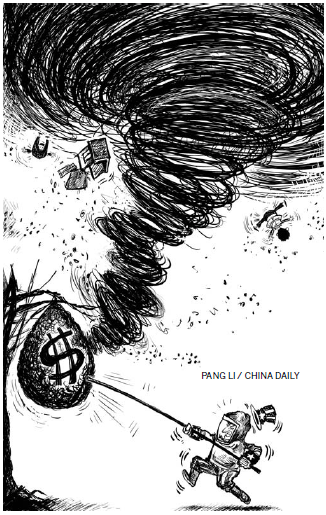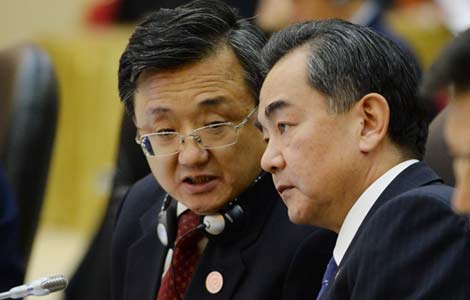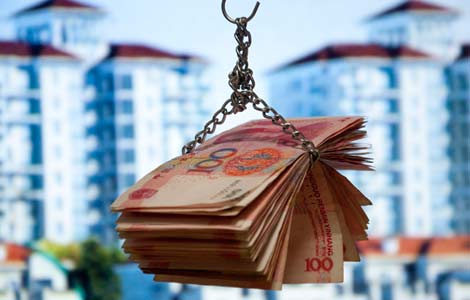The US as a global risk generator12
Updated: 2013-07-01 09:10
By Kevin P. Gallagher (China Daily)
|
||||||||

The US economy continues to have a hard time recovering from the global financial crisis. So the last thing one would expect the US government to do is to engage in policies that open the floodgates to severe risks in financial markets again. And yet it is precisely doing that.
For all the attention being paid to the Federal Reserve's "tapering", what Washington has in its crosshairs is something quite different. It is putting massive pressure on the Commodity Futures Trading Commission and the Security and Exchange Commission. Unless policymakers, and the public at large, act quickly to counter that pressure, the disastrous past - a financial industry running amok - may well be not just be the US' national but also the common global future.
How is this even possible? Even though the US Congress passed the Dodd-Frank financial reform law a few years ago as a bulwark against reccurring financial crises, the legislation actually left most of the key decisions - the actual detailed rule making to rein in the financial industry - for later.
At the center of this entire issue is Gary Gensler, a former Goldman Sachs partner, who is now the Commodity Futures Trading Commission chairman. Gensler is one of the few officials who can credibly say that, having worked in the lion's den for many years, he is committed to rectifying what he knows is truly troublesome in the boiler rooms of the US financial industry.
And yet the deck is stacked against him. But this unsettling imbalance in the US political process has consequences way beyond US borders, because its financial industry is still in a dominant position globally, and sets many of the standards and practices for "what goes". Besides, the G20 and the Financial Stability Board have also pledged that powerful countries like the US would see to it that the global impact of their national rule making would be taken into account.
But now the US could blow a hole in the Dodd-Frank law that would allow many of the key global operations of US banks to be entirely exempted from regulation. In fact, the first blow came late last year. When the US Congress was on Thanksgiving holiday, the Treasury Department very quietly exempted foreign exchange swaps and forwards from the regulations.
Why should the American and global public care about this? After all, when US banks operating offshore, and in places like the Republic of Korea, sell FX derivatives to exporters, it allows them to hedge against FX risks. That sounds innocuous enough.
However, when the last financial crisis hit there was such a flight of capital out of emerging markets and back into the US that many of those positions were rapidly unwound - to the great detriment of those economies. Such are the massive - and global - transmission effects of today's tightly integrated financial markets.
Never relenting, these same FX derivatives market operators got very busy again right in the wake of the global financial crisis. Hedge funds and big banks engaged in the carry trade. They borrowed in US dollars at very low interest rates and then invested in foreign currencies in a broad range of countries, from the ROK, Brazil, Chile, Colombia and Mexico to South Africa, Indonesia and Thailand. Financial professionals, that as those running hedge funds and banks are, then built FX derivatives that shorted the dollar and went long on those currencies.
This fueled exchange rate appreciation and created asset bubbles that are part of the reason for the slowdown in emerging markets. Now that the Fed is looking to wind down its easing policies, capital is fleeing emerging markets again, causing exchange rates to depreciate and debt burdens to rise.
By now, it is a familiar story. Financial engineering, largely by US-owned companies, generates serious blowback in the real economy - and hurt themselves too in the process. Citigroup, a too-big-to-fail bank, may lose up to $7 billion in FX derivatives markets if the dollar appreciates as capital flies back to the US.
The next regulatory blow may hit any day. The CFTC and the SEC are now considering exempting the same foreign subsidiaries and branches of hedge funds and big banks headquartered or with stakes in the US that have been packaging derivatives overseas.
This would be disastrous for emerging markets and developing countries attempting to maintain financial stability for development. To their credit, the ROK and Brazil both have put in place their own regulations on FX derivatives, but emerging markets alone cannot carry the burden of regulating a $4 trillion-per-day market.
Gensler has said that, if these regulations are swapped out of rule making, hedge funds can evade the rules "by setting up shop in an offshore locale, even if it's not much more than a tropical island P.O. Box." Gensler needs a majority of commissioners to help him plug this loophole by July 12. Time is running out. The world cannot afford to create major loopholes that could threaten the global financial system yet again.
The author is co-director of Boston University's Global Economic Governance Initiative and co-chair of the Pardee Task Force For Regulating Global Capital Flows and Development, and a regular contributor to The Globalist.
The Globalist
(China Daily USA07/01/2013 page12)

 Gay pride parade around the world
Gay pride parade around the world
 Four dead in Egypt clashes, scores wounded
Four dead in Egypt clashes, scores wounded
 New NSA spying allegations rile European allies
New NSA spying allegations rile European allies
 Foreign minister makes ASEAN debut as tensions flare
Foreign minister makes ASEAN debut as tensions flare
 Yao stresses transparency in charity
Yao stresses transparency in charity
 NYC's gay pride march for celebration
NYC's gay pride march for celebration
 Massive debt plagues local gov't
Massive debt plagues local gov't
 Looking abroad for better investment
Looking abroad for better investment
Most Viewed
Editor's Picks

|

|

|

|

|

|
Today's Top News
Chinese, US deals will grow this year
US updates duties on Chinese honey
Looking abroad for better investment
Mixed outlook for EV makers in China and US
Obama to announce new power initiative for Africa
China's June manufacturing PMI falls to 50.1
Longer term for visas to attract talent
Putin signs anti-gay measures into law
US Weekly

|

|






